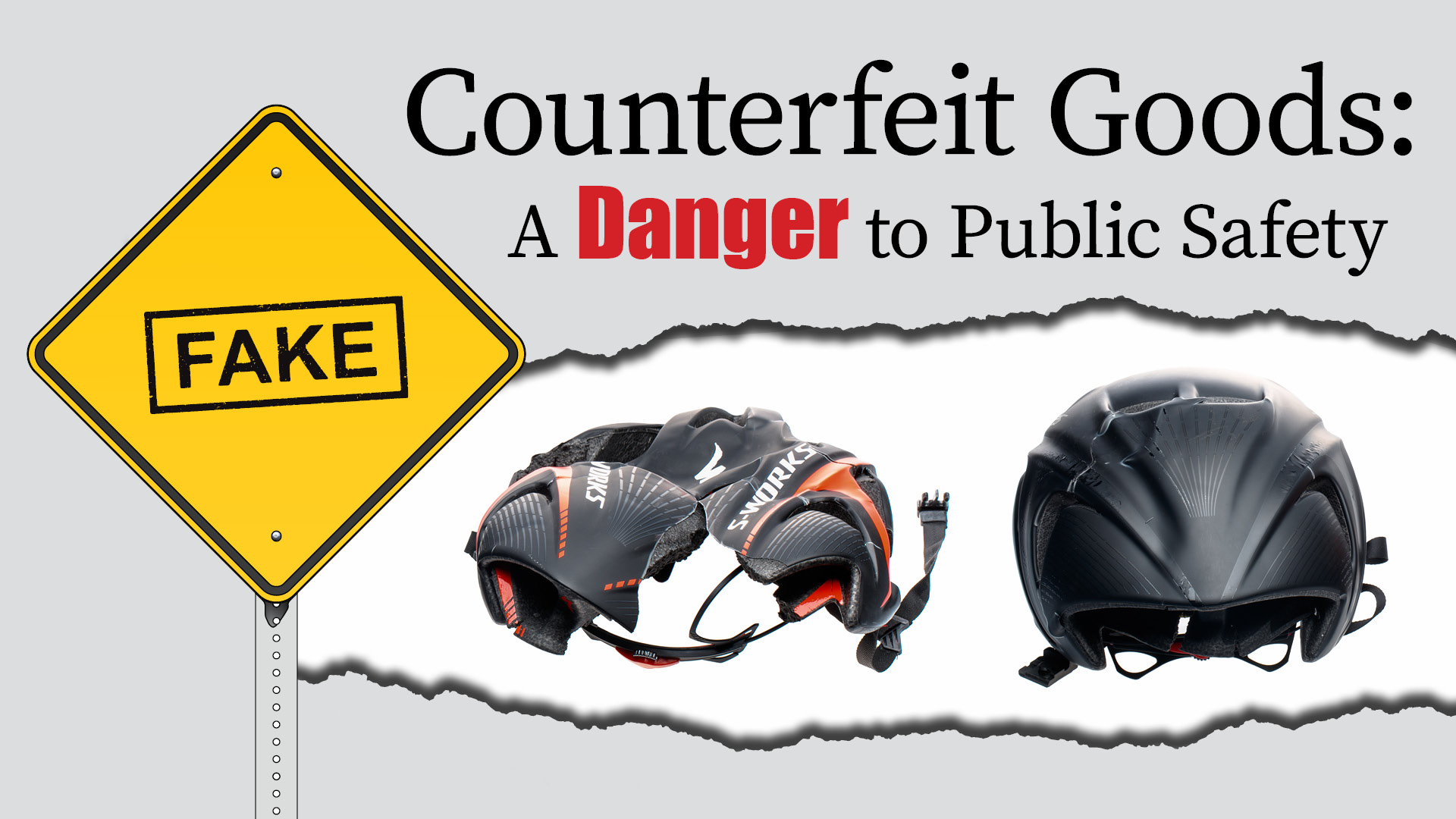
Overview
The production and trafficking of counterfeit goods poses a significant health and safety threat to consumers. It also impacts the economic growth of legitimate businesses and consumers through lost revenue, downtime, and replacement costs. To mitigate these threats and help ensure public safety, agents with U.S. Immigration and Customs Enforcement (ICE) Homeland Security Investigations (HSI) National Intellectual Property Rights Coordination Center (IPR Center), work alongside federal, state and local law enforcement partners across the country to dismantle counterfeit operations and hold individuals involved in them accountable.
“Counterfeit products not only attack the name and value of a known business, but, in many cases, can cause harmful, and sometimes fatal, consequences for the unsuspecting buyer,” said Mark Zito, Deputy Special Agent in Charge for HSI Los Angeles. “These fakes have no place in a fair, legitimate marketplace. The public should be assured that HSI is committed to targeting the unscrupulous vendors of substandard merchandise year-round. They are the ones who may pay the steep price.”
Operations to combat the manufacture and distribution of counterfeit goods help ensure public safety and national security by preventing dangerous and harmful goods from entering the market and promoting the integrity of legitimate trade systems.
"Law enforcement has identified a trend of counterfeited products that is growing at an alarming rate," said Steve Francis, Assistant Director for HSI’s Global Trade Investigations Division and Director of the IPR Center. "At best, these products will not perform as well as authentic products. At worst, they can fail catastrophically.”
Some of the most dangerous counterfeit products involve automotive parts, electronics, safety equipment, prescription drugs, and cosmetics due to the potential threats they present to public safety and public health:
- Counterfeit airbags and their components can cause severe malfunctions ranging from non-deployment, under inflation, over inflation to explosion of metal shrapnel during deployment in a crash.
- Counterfeit lithium-ion laptop batteries pose significant risk of extreme heat, self-igniting, and exploding.
- Counterfeit helmets and baby carriers can break.
- Counterfeit prescription drugs may not contain the active ingredient or could lead to accidental overdose.
- Counterfeit cosmetics can cause severe skin reactions.
These counterfeit goods usually bear the trademark of a legitimate and trusted brand, but they were produced by another party and are not made to the specifications of the original manufacturer. They're often produced illegally and sold at a profit to fund other criminal activities. This makes the production and trafficking of counterfeit goods a transnational crime, commonly linked to transnational criminal organizations (TCOs). As such, related commercial fraud violations are also investigated by HSI’s Border Enforcement Security Task Forces (BESTs).
For more information on how to avoid consumer fraud and counterfeit products, read this FTC advisory.

ICE in the News & Case Files
ICE HSI launches Operation Stolen Promise, targeting COVID-19 fraud and illicit criminal activity
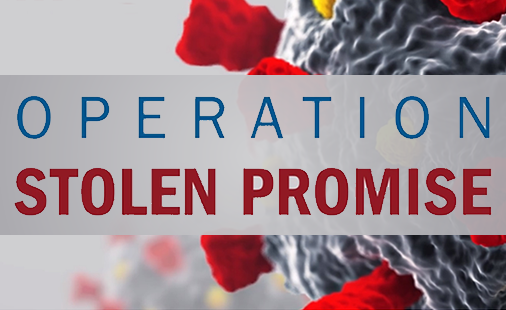
WASHINGTON – ICE HSI announced on April 15, 2020, the launch of Operation Stolen Promise to combat COVID-19 related fraud and other criminal activity. The operation intensifies collaboration with multiple federal departments and agencies, along with business and industry representatives. Surging criminal activity surrounding the COVID-19 pandemic requires an equally robust investigative response to protect the American public.
“HSI will bring every asset to bear against anyone targeting consumers with financial schemes or fraudulent products that jeopardize the health and safety of Americans,” said HSI Acting Executive Associate Director Alysa D. Erichs. “This unified effort brings a whole-of-government approach to monitor, investigate and arrest those responsible for endangering the public with criminal acts of fraud related to the COVID-19 pandemic.”
Criminal organizations that have historically been engaged in financial scams are pivoting to exploit the coronavirus pandemic and the associated stimulus package for illegal financial gains. These networks are smuggling and selling counterfeit safety equipment and prohibited testing kits, medicines, and hygiene products, as well as running illicit websites to sell their merchandise. In the coming weeks, it is expected that financial fraud scams involving financial relief, COVID-19 stimulus checks, and traditional boiler room operations will increase. All these fraud scams also impact government public benefit agencies that are in the process of distributing aid and providing assistance.
As of May 5, 2020, HSI special agents have opened over 340 investigations nationwide; seized over $3.2 million in illicit proceeds; made 11 arrests, executed 22 search warrants; sinkholed over 11,000 COVID-19 related domain names and worked alongside U.S. Customs and Border Protection to seize 494 shipments of mislabeled, fraudulent, unauthorized or prohibited COVID-19 test kits, treatment kits, pharmaceuticals, homeopathic remedies, purported anti-viral products and personal protective equipment (PPE). The launch of the operation is in direct response to a significant increase in criminal activity.
Operation Stolen Promise combines HSI’s expertise in global trade investigations, financial fraud and cyber investigations with robust private and public partnerships to disrupt and dismantle this criminal activity and strengthen global supply-chain security.
For more information on Operation Stolen Promise, click here.
“Operation Holiday Hoax” seizes counterfeit toys worth more than $5 million
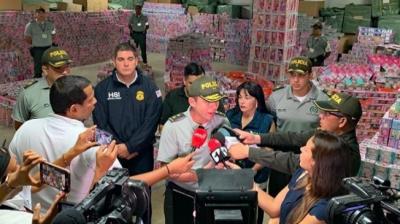
CARTAGENA – In a port capable of handling more than 2.4 million tons of cargo in a year, you would think a cargo shipment of toys could easily get lost in the daily shuffle. Not so when a suspicious shipment arrives from China containing counterfeit toys, some of which tested positive for lead content.
The discovery was part of Operation Holiday Hoax, a multi-agency enforcement effort involving HSI Cartagena’s Transnational Criminal Investigative Unit, U.S. Customs and Border Protection’s (CBP) Container Security Initiative, the Colombian Police Fiscal and Customs Unit, and the National Directorate of Tax and Customs (DIAN). The team seized a total of 155,000 units of toys suspected of trademark infringement involving Disney, Marvel Characters Inc., Peppa Pig, and L.O.L. Surprise! brands that – if genuine –would retail for more than $5.4 million.
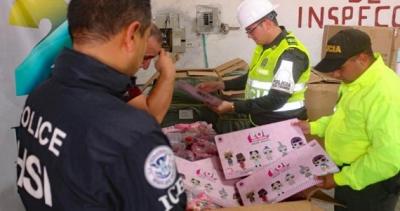
Additionally, HSI Cartagena, in conjunction with DIAN, targeted a suspicious shipment of more than 500 cartons from Hong Kong said to contain mostly toys in August 2019. Four more containers were targeted for inspection over the next two months. An inspection of the shipments revealed more counterfeit toys including some that were collected for further lead testing. This all came on the heels of Operation Firefox, a separate initiative that resulted in the seizure of 36,000 pairs of counterfeit athletic shoes and more than 1,000 other miscellaneous items.
Suspected nationwide distributor arrested, $15M in counterfeit jewelry seized
KTLA 5 reported that in November 2019, local and federal partners recovered more than $15 million in counterfeit jewelry following a multi-location search in the downtown Los Angeles Jewelry District, CA. In addition, one individual was arrested on suspicion of felony trademark violations.
Investigators conducted surveillance and executed several undercover purchases and determined that Moossa Lari was a major distributor of counterfeit jewelry nationwide, according to police. The counterfeit jewelry was tested at the scene and investigators found that the products did not meet U.S. safety standards, containing levels of lead and cadmium as high as 200,000 parts per million (ppm), more than twice the acceptable level of 90 ppm, authorities said. Investigators also found nearly $58,000 in cash.
The arrest and seizures were the result of an investigation conducted by the Los Angeles Police Department’s Commercial Crimes Division, in collaboration with HSI, the FBI, and CBP.
Bike helmets that don’t meet safety standards are widely available
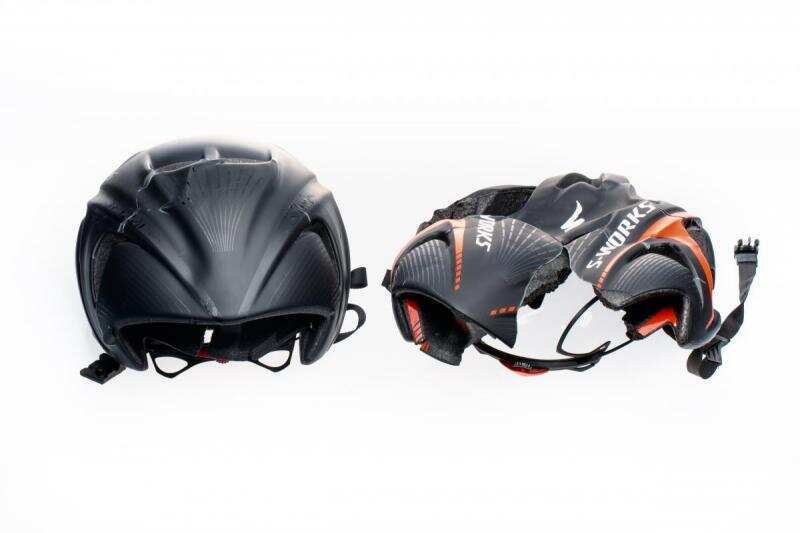
Consumer Reports warned if shopping for a bicycle helmet, consumers might assume that the products under consideration have met some basic standards for safety. But a recent investigation found that potentially unsafe helmets are widely available online.
To be legally sold in the U.S., bicycle helmets are supposed to meet standards set by the Consumer Product Safety Commission (CPSC). Those standards require a certain level of protection from skull fracture and a detailed label with information demonstrating compliance with CPSC standards.
When purchasing products online, however - even regulated products like helmets — it can be difficult to know if a product purchased is truly certified as safe.
On e-commerce marketplaces around the globe, there may be thousands of listings for helmets that are not properly certified for safety or are counterfeit versions of real products, says Andrew Love, head of brand security for helmet maker Specialized Bicycles. It’s hard to know exactly how many consumers end up buying counterfeit helmets or helmets that are potentially unsafe knock-off versions of brand-name helmets, says Thom Parks, the senior director of product safety for Bell and Giro.
Helmets aren’t the only products being counterfeited and mislabeled. According to IPR Center Director Steve Francis a flood of cheap, potentially uncertified products like counterfeit pharmaceuticals and computer chargers or adaptors—which can catch fire if not properly made—can also be produced en masse, then sold through online marketplaces with few built-in safeguards.
Over 5,200 Fake Refrigerator Water Filters from China Seized in California
CBP reported its officers in Los Angeles seized more than 5,000 counterfeit refrigerator water filters shipped into the U.S. from China. The items were seized after Machinery Center import specialists confirmed that the filters infringed Brita, GE, Frigidaire, PUR, and NSF certification protected trademarks.
NSF International is an accredited, third-party certification body, which tests and evaluates products to public health and safety standards. Products certified by NSF have been tested, evaluated, and determined to comply with specific standards, policies and procedures. The water filters seized contained counterfeit NSF certification markings printed on the products, and have not been evaluated, tested or certified by NSF.
Between October 1, 2018 and September 2019, nearly 170,000 counterfeit replacement refrigerator water filters, under sink ion exchange filters, pool and spa filters, and water bottle filters were seized, with a combined MSRP of close to $8.5 million.
CBP officers in coordination with ICE HSI special agents assigned to the Trade Enforcement Coordination Center (TECC) worked closely to identify potential violators responsible for importing these water filters.
Vero Beach doctor sentenced to life in prison in counterfeit drug case
Johnny Clyde Benjamin, Jr., M.D., 52, an orthopedic surgeon practicing in Vero Beach, Florida, was sentenced to life in prison in November 2018, following his conviction on charges linking him to a conspiracy to possess with intent to distribute furanyl fentanyl which resulted in death; aiding and abetting the distribution of furanyl fentanyl, which resulted in death; attempted possession with intent to distribute acetyl fentanyl; possession with intent to distribute oxycodone; and conspiracy to possess with intent to distribute hydrocodone and oxycodone.
According to evidence presented at the trial, a young woman who resided in Wellington, Florida, died after overdosing on counterfeit oxycodone pills. The pills contained a fentanyl analog, furanyl fentanyl, as the active ingredient. Furanyl fentanyl is an extremely powerful synthetic opioid, many times more powerful than street level heroin or oxycodone. A toxicology analysis attributed the cause of death to the furanyl fentanyl. Dr. Benjamin was identified as the source of the pills, and that he was also involved with the manufacture and distribution of counterfeit oxycodone pills outside the South Florida area.
The case was investigated jointly with ICE HSI.
ICE HSI helps investigate counterfeit, misbranded contact lenses
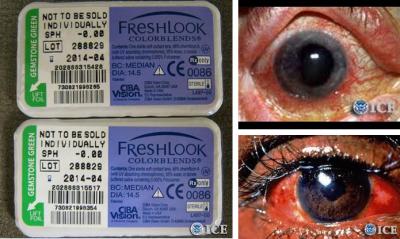
The owner and operator of Candy Color Lenses, a major online retailer of colored contact lenses in the United States, pleaded guilty in September 2016 to running an international operation importing counterfeit and misbranded contact lenses from suppliers in Asia and then selling them over the internet without a prescription to tens of thousands of customers around the country. It's believed to be the largest-ever investigation of counterfeit and misbranded contact lenses in the United States.
Dmitriy V. Melnik, of Las Vegas, pleaded guilty to one count of conspiracy to traffic in counterfeit goods and to introduce into interstate commerce misbranded devices.
As noted in the plea agreement, contact lenses are medical devices that must receive FDA authorization to enter the U.S. and be further distributed. Melnik sold what they claimed to be authentic contact lenses to tens of thousands of customers around the U.S. without a prescription, adequate directions for use and adequate warnings. After purchasing the contact lenses, many customers complained directly to Melnik about the quality of the contact lenses and questioned him about whether the contact lenses were genuine and FDA approved, according to the plea agreement. Melnik admitted that some of the contact lenses he sold were tested and found to be contaminated with potentially hazardous bacteria.
The agreement also revealed Melnik received at least $1.2 million in gross revenue from this illegal enterprise, including approximately $200,000 alone from the sale of counterfeit Ciba Vision FreshLook COLORBLENDS.
The prosecution was the result of an ongoing multi-agency effort to combat counterfeit, illegally imported and unapproved contact lenses called Operation Double Vision. The FDA's Office of Criminal Investigations led the investigation, with significant support from the U.S. Postal Inspection Service and ICE HSI.
Contact lens causes Michigan teen to suffer severe eye injury
A St. Clair Shores, Michigan, teen was left partially blind in one eye after wearing a pair of costume contacts during Halloween 2015. A month later, the Lakeview High School senior faced possible surgery.
What was supposed to be part of a fun Halloween costume for the 17-year-old and her friends, all dressing up as zombies with creepy contact lenses, turned into a real nightmare the very next day.
According to the girl's mother, her eye was swollen and red as if she had pink eye. It was a lot worse. According to the family, a lens had ripped out a top layer of her cornea.
The family says the lenses were bought at a booth set up at a local shopping center.
ICE HSI told local media that no one should be selling any type of contact lenses, except doctors.

About the IPR Center
The IPR Center has been at the forefront of America's response to intellectual property theft and its enforcement of international trade laws for more than 12 years. Its efforts have a direct impact on the nation's health and safety, economy, and warfighters.
Created in 2008 and formally codified in the Trade Facilitation and Trade Enforcement Act of 2015, the Center is one of the U.S. government's key weapons in the fight against criminal counterfeiting and piracy. Led by an HSI director, along with deputy directors from HSI, the Federal Bureau of Investigation, and U.S. Customs and Border Protection, the center brings together 25 key federal and international agencies in a task force setting using a three-pronged approach to combat intellectual property and commercial fraud crimes: interdiction, investigation, and outreach. This enables the IPR Center to leverage the resources, skills, and authorities of each partner.
For Fiscal Year 2019, HSI seized counterfeit goods totaling an estimated manufacturer’s suggested retail price (MSRP) of more than $560 million. During the same period, HSI’s Intellectual Property and Trade Enforcement efforts, supported by the IPR Center, led to 362 arrests, with 303 indictments and 231 convictions.
About HSI BEST
The primary mission of HSI’s Border Enforcement Security Task Forces (BEST) is to combat emerging and existing transnational criminal organizations (TCO) by employing the full range of federal, state, local, tribal and international law enforcement authorities and resources in the fight to identify, investigate, disrupt and dismantle these organizations at every level of operation.
The BEST investigative model is a comprehensive response to the growing threat to border security, public safety and national security. BESTs eliminate the barriers between federal and local investigations (access to both federal and state prosecutors) and close the gap with international partners in multinational criminal investigations.
BESTs are located along the northern and southwest land borders, major seaports, and international airports from Hawaii to Puerto Rico. These BESTs comprise approximately 1,000 members representing more than 100 federal, state, local, tribal and international law enforcement agencies that have jointly committed to investigate transnational criminal activity and enhancing border security.